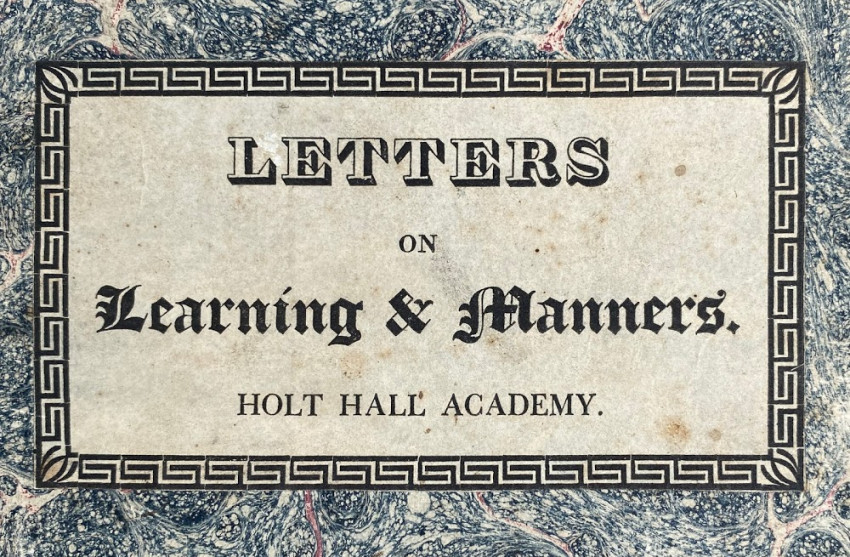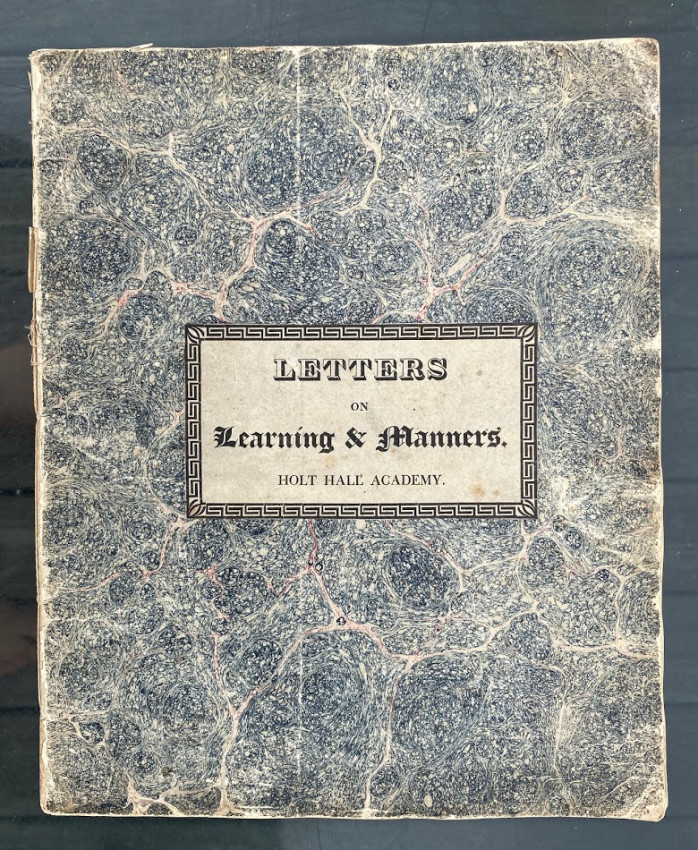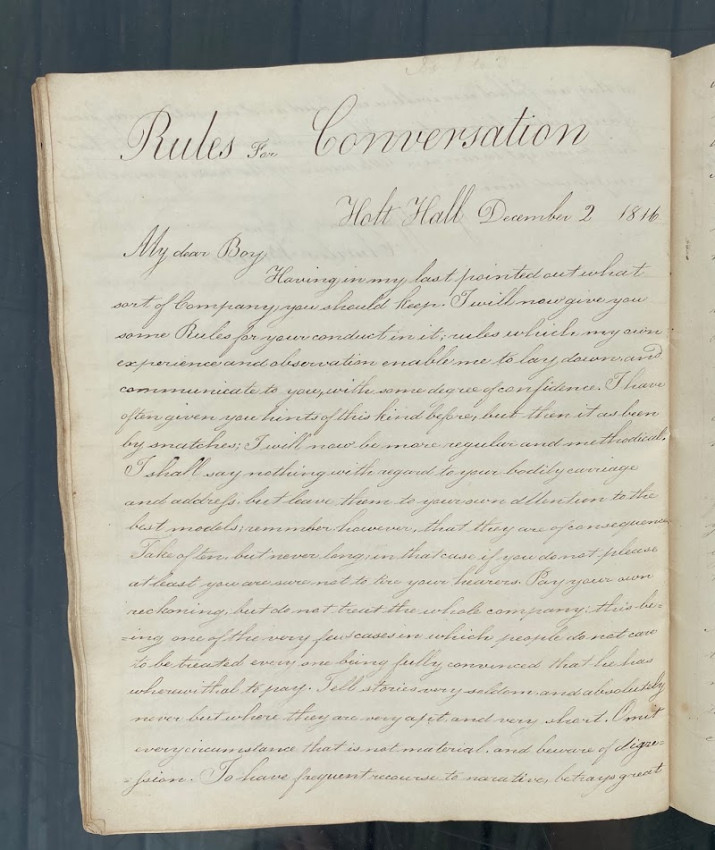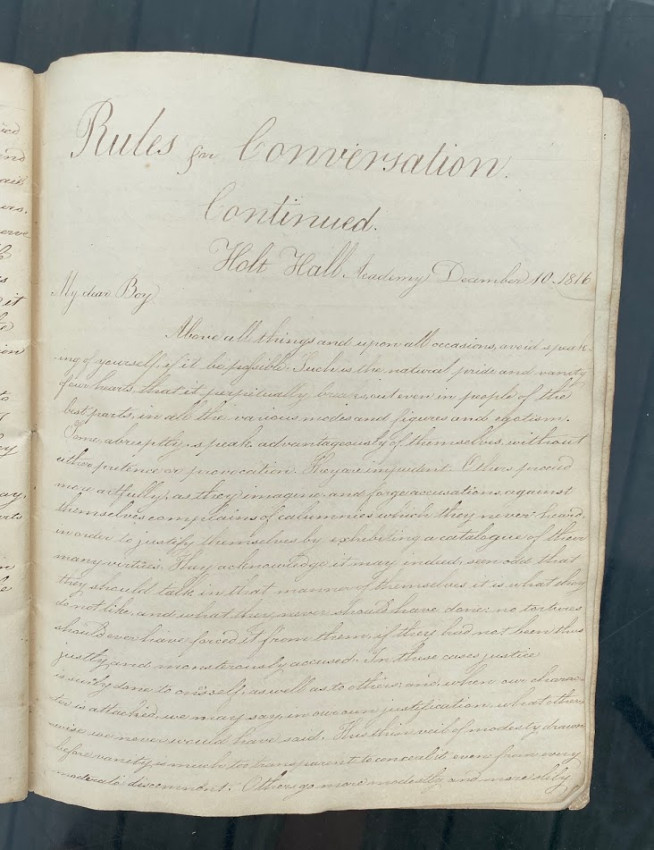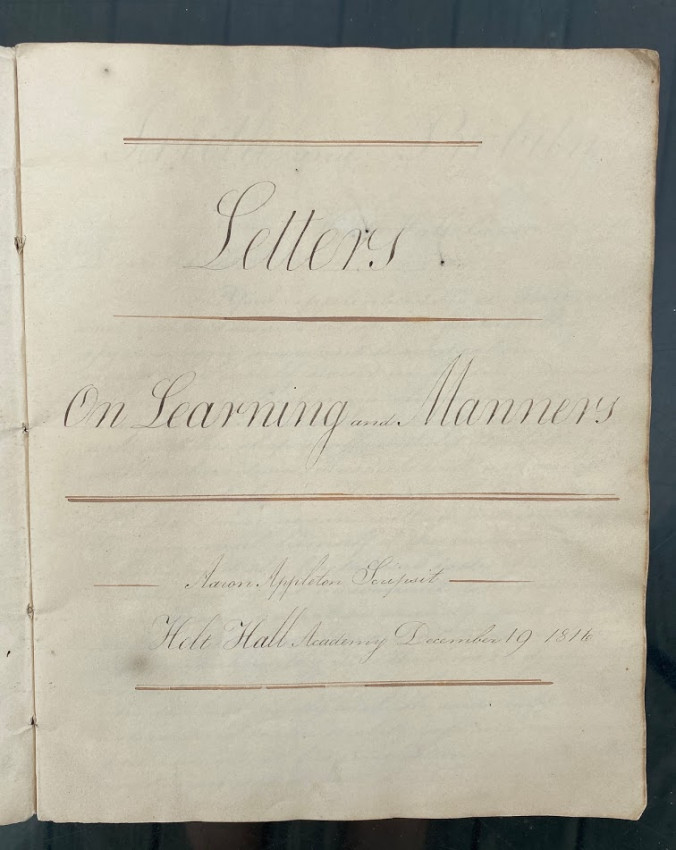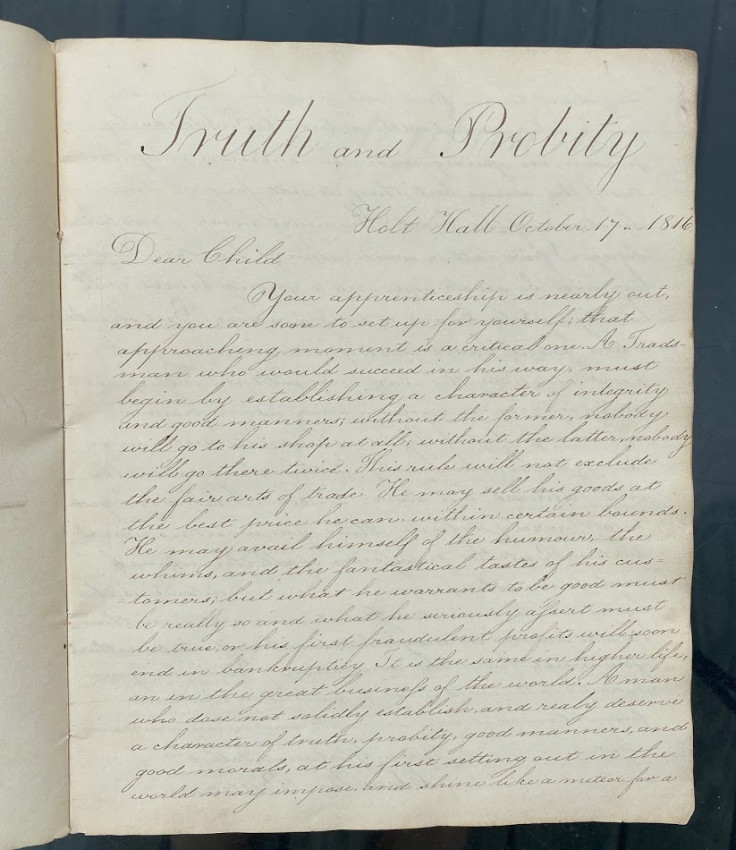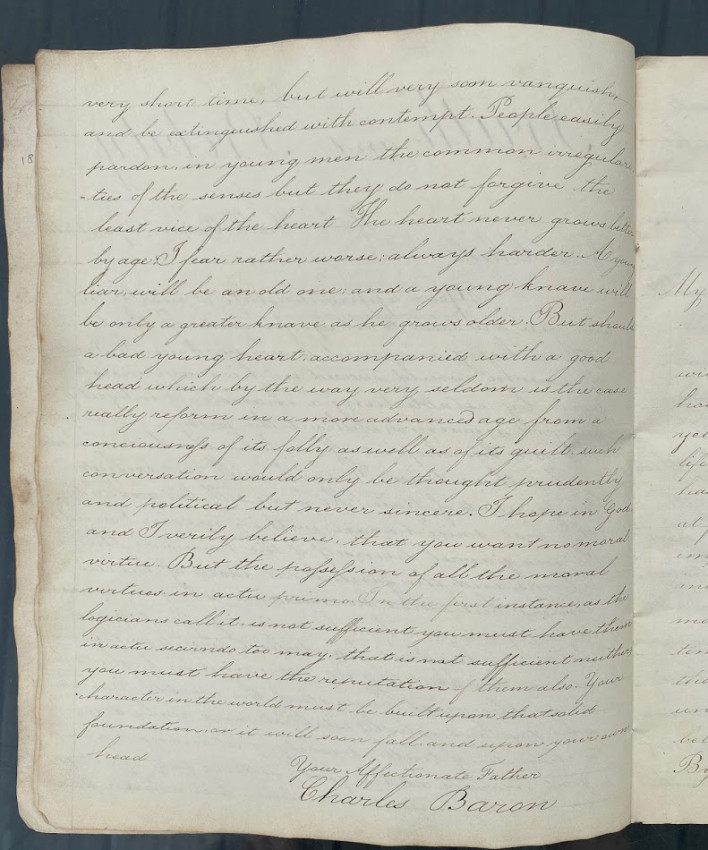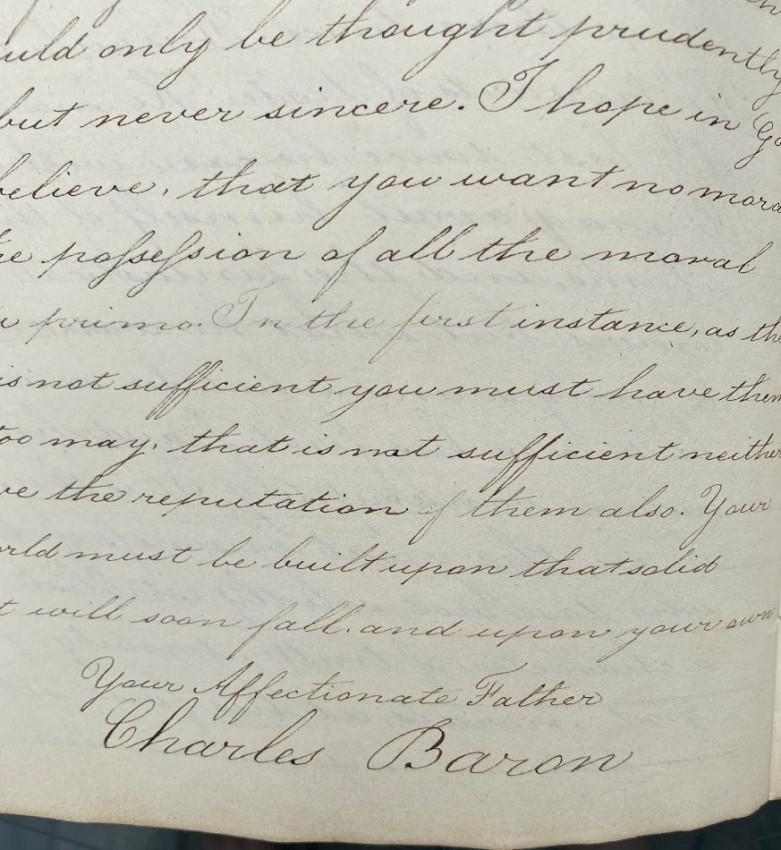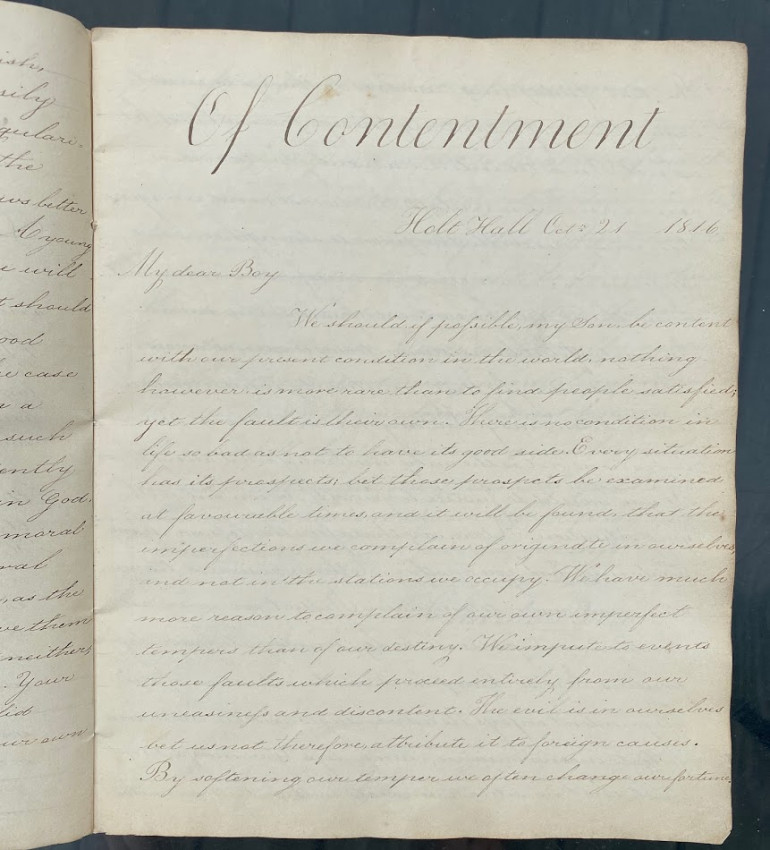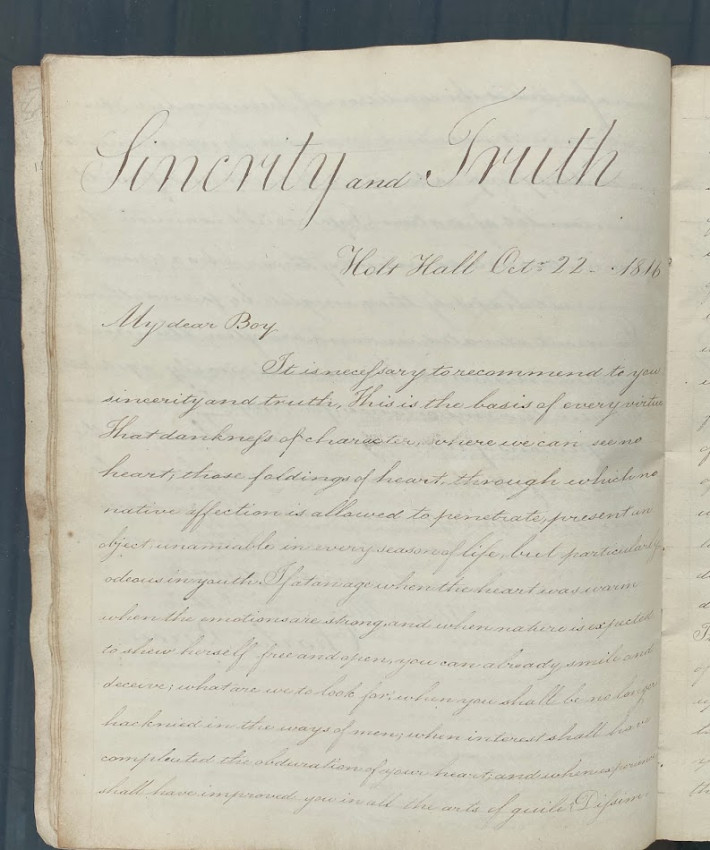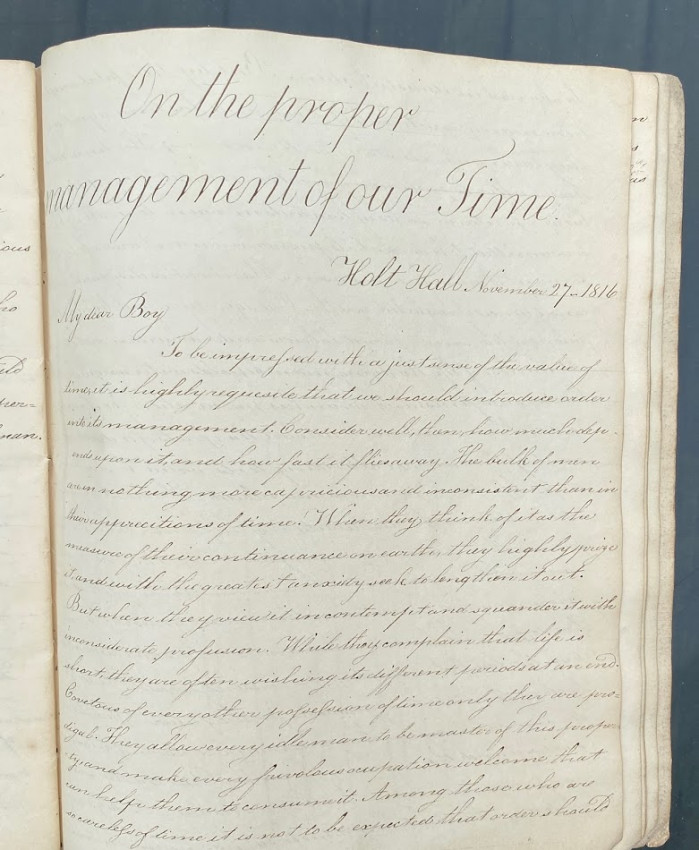[Charles BARON (schoolmaster)]. – Aaron APPLETON (pupil at Holt Hall Academy).
Manuscript “Letters / On Learning and Manners. / Aaron Appleton sculpsit / Holt Hall Academy December 19 1816.” [Prescot, Lancashire, England: entries dated from 17 October – 10 December 1816, watermarked ‘Whatman / 1814’]. Quarto (10 1/8 x 8 1/4in; 258 x 210mm), manuscript calligraphic title (verso blank), 43 unumbered pages. The text in the form of calligraphic copies of 14 letters apparently from Charles Barron to ‘Dear Child’, ‘Dear Boy’ or ‘My Dear Boy’, all signed ‘Your affectionate Father / Charles Baron’.
Original marbled paper wrappers, letterpress label to upper cover “Letters / on / Learning & Manners. / Holt Hall Academy’
The improving subjects of the letters include: Truth and Probity; Of Contentment; Sinc[e]rity and Truth; Industry and Appreciation; Benevolence and Humanity; On Friendship; Modesty and Docility; Of Religion; Choice of Friends; Good Company; Management of our Fortune; Due Regulation of Pleasure; On the proper management of our Time; Rules for Conversation; Rules for Conversation continued; Rules for Conversation continued [part 2].
We know something of the sort of establishment that Charles Baron ran from the description given by Philip Meadows Taylor (1808-1876) in his autobiography ‘The Story of My Life’. Meadows Taylor was a contemporary Appleton.
“Charles Baron plied his schoolmaster's profession in and around Knowsley for over 40 years, probably commencing in the late 1780s and continuing till his death in 1830. We know from a newspaper advert in early 1808 that he ran Knowsley Academy up to the end of 1807 and then removed himself just a few miles to Holt Hall near Prescot. Holt Hall Academy continued up until at least 1818 [actually, at least 1820], after which Baron moved again to Whitfield House in nearby Roby, styling his school Roby Academy. After his death this school was run by his sons John and Thomas, who had no doubt assisted their father during his lifetime.A description of life at Holt Hall Academy was provided by the soldier and novelist Meadows Taylor, who spent an unhappy year or two there in about 1816-7. Like similar accounts of school life, it was composed some years after Charles Dickens had savaged private schools in the north of England in Nicholas Nickleby and thereby created an expectation on the part of readers. Taylor was just 9 when he left Holt Hall but he tried to be fair in his subsequent memoirs (The Story of My Life, 1878):
There were, I believe, about a hundred boys, and the school had a wide reputation. It was a rough place, although scarcely equal to the Yorkshire school of Mr Squeers; but I, fresh from the gentle presence and teachings of my mother, felt the change keenly, and was almost inconsolable - so much so, that I was sent home after a while, and when I returned to Mr Barron's, it was as a parlour boarder, a distinction which caused much jealousy, and subjected me to much torment. I was the youngest boy in the school, teased and bullied by all; but after I had received an enormous cake from home, which was divided among the boys, I grew more into favour, and even became a "pet" among them.
We rose at six in summer, partially dressed ourselves, and, with our jackets over our arms, went down to a stone bench in the yard, where stood a long row of pewter basins filled with water, and often in winter with ice. Here, in all weathers, we washed our faces and hands, combed and brushed our hair, and went into the schoolroom a while to study; then were let out to play till the bell rang for breakfast, consisting of fresh new milk, and a good lump of bread. At ten we were all in school again, and work went on, only interrupted by the instances of severe punishment which but too often occurred. The rod was not sparingly used, as many a bleeding back could testify, and I have often been obliged to pick the splinters of the rods from my hands.We were well fed on meat, cabbage, and potatoes, and rice or some plain pudding; on Sundays we had invariably roast beef and Yorkshire pudding. We went into school again at three. At five school broke up, and at seven we had our suppers of bread and milk; afterwards we could study or go out within bounds as we pleased. Good Mrs Barron attended to our personal cleanliness and to our health; and at stated seasons, especailly in spring, we were all gathered together in the dining-hall, where the old lady stood at the end of the room at a small table, on which was a large bowl of that most horrible compound, brimstone and treacle. The scene rises vividly before me, as we all stood with our hands behind our backs, opened our mouths and received each our spoonful, swallowed it down as best we could - and had to lick the spoon clean too! Surely this was a refinement of cruelty!….
Baron evidently had a good reputation as a schoolmaster, despite his fondness of the rod, and was able to attract the sons of both the Liverpool nouveaux riches … and those from more established families like the merchant Philip Meadows Taylor.” (www.researchers.plus.com/walmsley3a.htm )
- Binding Condition: extremities rubbed
- Overall Condition: Excellent
- Size: 10 1/8 x 8 1/4in; 258 x 210mm
- Sold By: Shadowrock Rare Books
- Contact Person: Adam Langlands
- Country: United States
- Email: [email protected]
- Telephone: 001-860-248-1547
- Preferred Payment Methods: Paypal, US$ checks and wire transfers, major credit cards through paypal
- Trade Associations: AA Approved


